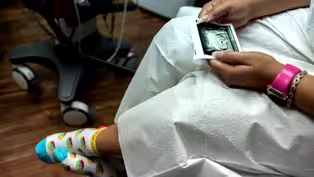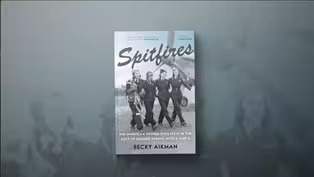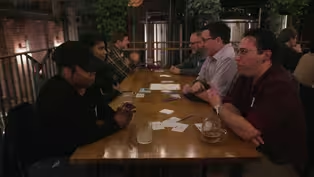
May 4, 2025 - PBS News Weekend full episode
5/4/2025 | 26m 45sVideo has Closed Captions
May 4, 2025 - PBS News Weekend full episode
May 4, 2025 - PBS News Weekend full episode
Problems playing video? | Closed Captioning Feedback
Problems playing video? | Closed Captioning Feedback
Major corporate funding for the PBS News Hour is provided by BDO, BNSF, Consumer Cellular, American Cruise Lines, and Raymond James. Funding for the PBS NewsHour Weekend is provided by...

May 4, 2025 - PBS News Weekend full episode
5/4/2025 | 26m 45sVideo has Closed Captions
May 4, 2025 - PBS News Weekend full episode
Problems playing video? | Closed Captioning Feedback
How to Watch PBS News Hour
PBS News Hour is available to stream on pbs.org and the free PBS App, available on iPhone, Apple TV, Android TV, Android smartphones, Amazon Fire TV, Amazon Fire Tablet, Roku, Samsung Smart TV, and Vizio.
Providing Support for PBS.org
Learn Moreabout PBS online sponsorshipJOHN YANG: Tonight on PBS News Weekend.
As 25 percent tariffs on imported auto parts take effect, what will they do to the prices of new and used cars?
Then the daring American women who flew combat aircraft in the skies over England in the Second World War.
And we explore a loneliness crisis that's taking its heaviest toll on young adults.
WOMAN: One of the trickiest things about loneliness is that the lonelier you are, the more negatively you see social situations and therefore the less likely you are to put yourself in social sit.
(BREAK) JOHN YANG: Good evening.
I'm John Yang.
Today, President Trump seemed to shrug off worries that his trade tariffs will raise prices on everyday items for Americans and force some to make do with less.
In an interview broadcast today on NBC's Meet the Press, moderator Kristen Welker asked him about predictions that prices on children's toys will go up.
DONALD TRUMP, U.S. President: I don't think a beautiful baby girl needs that's 11 years old, needs to have 30 dolls.
I think they can have three dolls or four dolls because what were doing with China was just unbelievable.
We had a trade deficit of hundreds of billions of dollars with China.
KRISTEN WELKER, NBC News Host: When you say they could have $3 instead of $30, are you saying you say they don't need Americans could see empty store shelves?
DONALD TRUMP: No, no, I'm not saying that.
I'm just saying they don't need to have $30.
They can have three.
They don't need to have 250 pencils, they can have five.
JOHN YANG: Prices on new and used cars are likely to go up because of the 25 percent levies on imported auto parts which took effect this weekend, and on imported cars which have been in place for nearly a month.
Erin Keating is executive analyst at Cox Automotive.
Erin, the tariff on auto parts is going to affect even cars made in the United States using components that are from foreign countries.
Is it possible to say how soon and by how much Prices are going to start to increase.
ERIN KEATING, Executive Analyst, Cox Automotive: Sure.
I mean, we've heard that from most automakers.
They're going to hold their MSRP, which is that suggested retail price, for now.
We've heard that some of them are going to wait until June to potentially adjust pricing.
Some of them may start adjusting pricing this may.
But for now, we're seeing a lot more that the pricing dynamics play out at the dealership level because of supply and demand.
Inherently, though, every automaker is going to have to find a way to afford these tariffs.
And so we do anticipate new and used vehicles going up in price over the year.
JOHN YANG: The president sees these tariffs as an incentive to get US Carmakers to bring their supply chains back to the United States.
How quickly could that happen and how costly would that be?
ERIN KEATING: It's a good question.
You know, we know that at a very minimum, it would be 18 to 24 months if you were talking about putting shovels in the ground and building new facilities and new production plants and so forth.
We believe that assembly might be a little bit easier, which will ease that 25 percent tariff on new vehicles crossing the border.
But parts are a very different story.
Manufacturers have been spending a lot of money with our country for decades now building more facilities here in the US.
JOHN YANG: And the effect on consumers, this isn't just going to be about finished product.
There are other ways the cost of car ownership are going to go up.
ERIN KEATING: Absolutely.
I mean, you know, when we're talking about the 25 percent on a vehicle coming over the border, that's really just a new vehicle that we're talking about.
But we know that a majority of our consumers are really looking in the used market.
And if you're owning a car right now and can't maybe afford a new car or maybe can't even afford the used cars that the prices are at, you're trying to repair your vehicle, you're trying to get insurance on those vehicles.
So maintenance and repair are bound to actually be a very universal challenge, cost wise, for all customers, not just individuals looking for new vehicles, because the parts themselves, as you said, came into effect yesterday and they will be tariffed at that 25 percent.
And that will just hurt all of consumers across the board, those that are looking for new cars and those that are needing to maintain and repair older cars.
JOHN YANG: And does it go beyond consumers?
Are dealers going to get squeezed too?
ERIN KEATING: Sure, of course.
I mean, every step of the way between when the car gets built and when it gets moved into the consumer's hands, all of those suppliers, they're helping to build the vehicles.
And a lot of those are small to midsize businesses who might be building that one bolt, that one nut that goes into the vehicle.
Right.
Or it's the dealer that's actually pulling the vehicle onto their lot, paying the manufacturer for that, and then charging the customer to take that car.
So there's a lot of different points in the process where the cost has an opportunity to go up for each stakeholder involved in it.
JOHN YANG: What advice would you give someone who's looking to buy a car in this environment?
ERIN KEATING: You know, the thing that we have right now is we do actually have lots of choice.
I know President Trump was talking about how we don't need $30.
Maybe we only 3.
Well, we do actually have a lot of vehicles on the ground and a lot of options for those that might be a little bit more financially squeezed.
My advice would be to be open minded about which vehicle you're looking at.
There are a lot of different manufacturers.
Everyone is really impacted by this very differently.
It really depends all the way down to the vehicle level how much the tariffs are going to cost the manufacturer.
So be open.
If you're looking for a compact SUV, but you really could fit in a subcompact SUV, you make sure that you're looking at both varieties.
If you typically shop one brand, be open to another brand and really go and do your shopping online.
Use resources like Kelley Blue Book Autotrader and other resources to search and research vehicles and then use your dealer.
They are the best resource for knowing what's available on the ground and how they can get you into a vehicle for your monthly payment.
JOHN YANG: Erin Keating of Cox Automotive, thank you very much.
ERIN KEATING: Thank you.
JOHN YANG: During that Meet the Press interview, the president also said that despite the Supreme Court directing him to facilitate the return of Kilmar Abrego Garcia to the United States, he wants to continue mass deportations.
DONALD TRUMP: I was elected to get him the hell out of here, and the courts are holding me from doing it.
KRISTEN WELKER: But even given those numbers that you're talking about, don't you need to uphold the Constitution of the United States as president?
DONALD TRUMP: I don't know.
I have to respond by saying, again, I have brilliant lawyers that work for me and they are going to obviously follow what the Supreme Court said.
What you said is not what I heard the Supreme Court said.
They have a different interpretation.
JOHN YANG: Mr. Trump said the White House may ask the justices to clarify their decision.
In the interview, Mr. Trump also said the value of the military parade that coincides with his birthday would outweigh the cost.
He doesn't intend to run for a third term, and he'd pay out of his own pocket to build a ballroom in the White House.
Air traffic at Israel's main international airport was halted today after a missile landed nearby.
Iranian backed Houthi rebels took responsibility for the attack near Ben Gurion Airport.
They say the strikes are in solidarity with the Palestinian people in Gaza.
Also today, the Israeli army called up reservists in order to expand its operations in Gaza.
Russian President Vladimir Putin says he hopes he won't have to use nuclear weapons in Ukraine.
In an interview on Russian state television, Putin also said he believes he can bring the war to what he called a logical conclusion.
The remarks came as emergency workers in Kyiv responded to an overnight Russian drone attack that injured 11 people, including two children.
Still to come on PBS News Weekend, the heroic women who flew combat planes in the face of danger during World War II and why young adults are finding themselves lonelier than ever.
(BREAK) JOHN YANG: For more than 50 years, millions of dollars in federal grants known as Title X, have funded clinics that offer free or discounted family planning services to mostly low income Americans.
In April, the Trump administration froze more than $65 million in grants, forcing some providers to shut their doors.
Ali Rogin spoke with Brittni Frederiksen, the associate director of women's health at the health policy nonprofit KFF.
ALI ROGIN: Thank you so much for joining us.
Tell us first about what sort of providers get these funds and what types of services do they provide?
BRITTNI FREDERIKSEN, Associate Director of Women's Health, KFF: Title X is the only federal program dedicated to providing family planning services to low income and uninsured individuals.
We're talking about birth control methods, sexually transmitted infection testing and treatment, pregnancy testing, cancer screenings like Pap smears and breast exams and other preventive services.
ALI ROGIN: We know so far that 16 out of 86 Title X grantees have received notices that they are losing their funding.
Why did the administration target some of these clinics and not others?
BRITTNI FREDERIKSEN: You know, it's really hard to tell.
Of the 16 grantees, it includes all nine of the planned Parenthood grantees in the network and then seven other nonprofit grantees.
And in the letters, they cited things like diversity, equity and inclusion violations.
And it had nothing to do with their grant applications.
But they cited public documents or websites, public facing job postings that said these organizations were either opposing racism or dedicated to advancing health equity.
ALI ROGIN: And so what does this mean for the patients who receive care at these clinics?
Are there other places that they can seek out these services?
BRITTNI FREDERIKSEN: For many Title 10 clinics, this is their only care provider.
The benefit of the Title X program is that it provides free and low cost family planning services to these individuals, which is difficult to find in other clinics.
And so these clients may have to pay out of pocket for their birth control or just may not be able to afford care.
ALI ROGIN: Where will these cuts be felt the hardest in terms of who's going to be affected?
BRITTNI FREDERIKSEN: Right now, 23 states are affected, so it's pretty wide reaching.
But the Southeast U.S. Was hit hardest, particularly red states.
Currently, Mississippi and Missouri have no Title X funding because of these withheld funds.
ALI ROGIN: And what about these states?
Are they equipped to fill these health care needs in other ways?
BRITTNI FREDERIKSEN: These tend to be states that reproductive health is not a priority for them.
And so clients will have to figure out another way to find care.
They could go to health centers that also provide free and reduced cost care.
But many health centers also receive Title X funding.
And so it is a challenge when this isn't available to these individuals.
ALI ROGIN: Knowing what we know about the Trump administration's efforts here, do we expect this to be the last in their efforts to restrict Title X funding, or do you think there's going to be more to come?
BRITTNI FREDERIKSEN: I think this is definitely just the beginning.
I think these grantees did anticipate that the Trump administration would change the Title X regulations.
In the first Trump administration, they changed the Title X regulations.
To exclude any clinic that had co located abortion services or provided abortion referrals and 1,000 clinics could no longer qualify to participate in the program.
And so in Project 2025 they have proposed to reinstate those regulations.
The other thing is there was a pre decisional budget released and the Office of Population Affairs that administers Title X funds was on a list of programs to be eliminated.
And so it remains to be seen what will happen to the program.
ALI ROGIN: Brittni Frederiksen, Associate Director of Women's Health at KFF, thank you so for being here.
BRITTNI FREDERIKSEN: Thank you Ali.
JOHN YANG: Wednesday is the 80th anniversary of VE Day, the day Germany's unconditional surrender took effect, ending World War II in Europe.
A new book, "Spitfires," tells the little known contribution 25American women made to that outcome by flying combat aircraft not for U.S. forces, which denied them the opportunity when America entered the war.
Instead, they flew for Britain's Air Transport Auxiliary, or ATA.
Earlier I spoke with Becky Aikman, the book's author, and asked her what these women did.
BECKY AIKMAN, Author, "Spitfires": The British were so desperate for help in the war that they sought out pilots from around the world, even pilots with injuries or from other countries, or even women to transport aircraft from the factories to the air bases because they needed to have a huge number of aircraft made available very quickly.
They also transported damaged aircraft back from the air bases to where they could be repaired, often not knowing what was wrong with them until they were high in the sky.
JOHN YANG: How did these American women get involved in this?
BECKY AIKMAN: They were all people who knew how to fly, and they all wanted to participate in the war.
But the United States military would not accept women as pilots.
But they heard that Great Britain would allow women to fly, and they went to Montreal to do a flight test.
25 of them passed.
And they went on ships across the sea to join in this effort.
JOHN YANG: And even though they were just ferrying planes, they were moving them around England.
It doesn't mean they didn't face danger.
I think you said that nearly one in seven died during the war.
BECKY AIKMAN: Yes, one in seven died during the course of the war.
They frequently crashed for a couple reasons.
One is that the aircraft were just coming off those assembly lines so quickly.
They weren't properly tested.
The pilots often got into the air and found that a part didn't work, the engine failed.
They would have to try to glide down and find a flat place to land.
That didn't always work.
They also encountered the changeable British weather.
They did not fly using instruments.
So if they suddenly flew into a cloud, they would lose their visibility and crash into a mountain, wind up too low and hit a church steeple.
People would be killed that way very frequently.
JOHN YANG: Also, there was a wide variety of personalities in this group.
Was there anyone in particular you grew fond of as you researched them and wrote about them?
BECKY AIKMAN: I was fond of all of them, John.
They were all big personalities.
They came from all aspects of American society.
One of them was a debutante from one of America's wealthiest families.
She was known as the Flying Socialite.
Her name was Virginia Farr.
It was for a family of the Western Union fortune.
Another one was an impoverished young woman with an 8th grade education.
Her name was Dorothy Furey, but she was very beautiful.
And when she went to England, she thought she could reinvent herself as she pleased.
She came with one red dress that she recycled and kind of an imperious attitude.
The British assumed that she was some sort of American aristocrat and she wound up joining the British aristocracy.
Some were stunt pilots who performed in air shows.
One of them was named Hazel Jane Raines.
She came from what she called a hat and gloves, churchgoing family.
She studied music in college, but afterwards she joined the Georgia Air show where she performed loop de loops and spins while the crowd screamed in terror.
JOHN YANG: As we said that the United States had nothing like this at the beginning of the war.
But Eleanor Roosevelt in particular was championing a U.S. version of that, and it led to the WASPs.
But it was very different from the ATA.
BECKY AIKMAN: Yes.
The WASP was formed partly because American officials studied the success of women pilots in the ATA in Britain and decided, okay, we will allow women to fly delivering aircraft within the United States.
It was a very different experience from the sort of freewheeling atmosphere in Great Britain.
The pilots lived in barracks.
They would fly one or two models of planes within the United States.
But most important, the pilots in Great Britain were admired and respected by the public, who appreciated that they'd come all this way to help.
In the United States there was a lot of skepticism about women pilots, and it was ended by the end of 1944, when the war was still raging, because the public didn't like the idea that women were in cockpits.
JOHN YANG: While in Britain the fliers in the ATA were treated as equals with the flyers in the RAF.
They opened a lot of doors for women, but did they stay open when they came back in post war?
BECKY AIKMAN: It was very difficult.
U.S. Airlines would not hire women pilots.
The U.S. military would not hire women pilots still.
Some of them, however, did manage to achieve a career in aviation by doing really unusual things.
One of them came back and worked as practically a janitor at a flying school, but she spent her time learning to fly helicopters.
She became only the second woman in the United States certified to fly a commercial helicopter.
And she founded the first helicopter charter company in Alaska, which was very successful.
Another one, Anne Wood, used the war to develop contacts within the society that was in London.
Expatriates, diplomats, business people, journalists, spies, generals.
After the war, she worked her way up and became the first woman vice president of a U.S. airline, which was Pan-Am.
JOHN YANG: Becky Aikman, author of "Spitfires."
Thank you very much.
BECKY AIKMAN: Thank you.
JOHN YANG: In a world where staying connected with family and friends can be as simple as pressing a button on your phone, many are finding themselves lonelier than ever.
As Isabella Jibilian of Rhode Island PBS Weekly reports, it's especially prevalent among young adults.
TABITHA GRANDOLFO, Brown University Student: I was, like, so nervous to go.
ISABELLA JIBILIAN (voice-over): At 17, Tabitha Grandolfo moved from Hong Kong to Providence, Rhode Island to study at Brown University.
TABITHA GRANDOLFO: It was 2021, and there were COVID restrictions meant that if I wanted to go home, I would have to spend three weeks in a hotel in quarantine before I was able to, like, go back and see my family.
ISABELLA JIBILIAN (voice-over): Living far from home, she began feeling depressed and lonely, and she was trouble making friends.
TABITHA GRANDOLFO: I was in a play and I was really excited.
It was my first, like, play that I did on campus.
A roommate and a friend came to see it, and I came back after the show and like, they didn't talk about it at all.
And then the two of them went to some, like, party or after party and left me in the dorm alone.
I was just sitting there in my room alone folding laundry.
ISABELLA JIBILIAN (voice-over): By the time she returned to Hong Kong at the end of freshman year, her depression had become overwhelming.
TABITHA GRANDOLFO: I remember, like, not being able to get out of bed, and my mom was like, do you think you can go back?
ISABELLA JIBILIAN (voice-over): Stories like Grandolfo's are all too familiar to psychologist and Harvard lecturer Richard Weissbourd.
RICHARD WEISSBOURD, Harvard's Graduate School of Education: When people think of loneliness, they often think of senior citizens.
But in our data, the people who have the highest rates of loneliness are young adults.
They're people in their 20s and they're people in their 30s.
ISABELLA JIBILIAN (voice-over): Weissbourd conducted a national survey on loneliness during the pandemic and found that one in three Americans felt miserable levels of loneliness.
For young adults, the numbers were even higher.
About 60 percent felt that way.
Those statistics have improved since that time, but remain a worry.
ISABELLA JIBILIAN: What particular challenges do young adults face that you feel contributes to this high rate of loneliness?
RICHARD WEISSBOURD: People don't feel a sense of community at work.
They don't feel identity or purpose in work that they once did.
There's much less participation in religion among young people.
And religious communities are places where you're asked to think about your responsibility for people in your community.
We're much less likely to reach out to people who are lonely or to create the kinds of communities where everyone feels a sense of belonging.
ISABELLA JIBILIAN (voice-over): In 2023, the US Surgeon General warned that there was an epidemic of loneliness.
DR. VIVIEK MURTHY, U.S.
Surgeon General: And social disconnection is associated with an increased risk of not only depression, anxiety, and suicide, but also heart disease, dementia, stroke, and premature death.
ASHLEY KIRSNER, Founder, Skip the Small Talk: Loneliness is just as deadly as smoking an entire pack of cigarettes a day.
ISABELLA JIBILIAN (voice-over): Ashley Kirsner has spent much of her career studying the psychology of loneliness.
ASHLEY KIRSNER: One of the Trickiest things about loneliness is that the lonelier you are, the more negatively you see social situations, and therefore the less likely you are to yourself in social situations.
ISABELLA JIBILIAN (voice-over): Kirsner saw firsthand how damaging this mindset can be.
For two years, she volunteered at a suicide hotline in Boston, where she began to notice a pattern among the people who called in.
ASHLEY KIRSNER: No matter who I was talking to, they generally had someone who cared about them in their life.
But when I asked them, oh, have you talked about how you're feeling to that person?
Almost across the board, people would say, oh, no, we just don't talk about that sort of thing, or, no, I don't want to be a burden.
It just seemed like the determining factor of whether you were lonely or not was whether you felt comfortable opening up to those people.
I started asking, well, if the roles were reversed, would you want them to tell you about it?
And the answer was, without exception, oh, of course I would want them to tell me about it.
So I realized there was this weird gap between how vulnerable people were comfortable being and how vulnerable people wanted others to be with them.
ISABELLA JIBILIAN (voice-over): It gave her an idea.
She created an event she called Skip the Small Talk where people could get together and practice being vulnerable.
ASHLEY KIRSNER: Before I knew it, we sold out at 50 tickets weeks in advance.
It was supposed to be a three hour long event and I had to kick people out after seven hours because they wouldn't stop talking to each other.
ISABELLA JIBILIAN (voice-over): Skip the Small Talk has since spread to more than 20 cities across the country.
WOMAN: All right, you got about 30 seconds left.
30 seconds.
ASHLEY KIRSNER: I remember one thing people expected at the event where, oh, I thought I was the only one who wanted to talk about this more vulnerable, deep stuff.
And people were surprised to see that other people wanted to talk about it too.
ISABELLA JIBILIAN (voice-over): Talking about it was also important for Brown student Tabitha Grandolfo.
She worked with a therapist, took medication for her depression, and opened up to a friend.
TABITHA GRANDOLFO: I told her I was like, I don't know how I'm feeling.
I'm feeling really nervous.
And I was telling her all the reasons why, and she was like, we can create a routine together.
ISABELLA JIBILIAN (voice-over): Each morning she and her friend would eat breakfast and then walk to class together.
And each evening they came together to do homework.
WOMAN: Thanks for coming.
ISABELLA JIBILIAN (voice-over): She also got involved with a mental health advocacy group called Active Minds.
TABITHA GRANDOLFO: The first day I joined, they're like, we're looking for someone to do our graphic design.
And I was like, I'll do it.
ISABELLA JIBILIAN (voice-over): The group has a tradition of making friendship bracelets.
WOMAN: Everyone have their eyes closed.
ISABELLA JIBILIAN (voice-over): Each bead that's shared represents a positive quality the giver sees in the recipient.
Grandolfo has kept her bracelets from years past.
TABITHA GRANDOLFO: I have some others, too, but this one I feel like is special because it's the first one that I did.
ISABELLA JIBILIAN (voice-over): They're a reminder of the community she has found.
TABITHA GRANDOLFO: No matter what happens, I can go on a Wednesday evening and be able to see these people who are willing to, like, listen to me.
ISABELLA JIBILIAN (voice-over): Grandolfo is now a senior and plans to graduate this spring with degrees in psychology and theater.
For PBS News Weekend, I'm Isabella Jabilian in Providence, Rhode Island.
JOHN YANG: And that is PBS News Weekend for this Sunday.
I'm John Yang.
For all of my colleagues, thanks for joining us.
Have a good week.
Family planning clinics lose funding over support for DEI
Video has Closed Captions
Clip: 5/4/2025 | 4m 21s | Family planning clinics lose Title X funding over statements supporting DEI (4m 21s)
How auto parts tariffs may affect new and used car prices
Video has Closed Captions
Clip: 5/4/2025 | 5m 2s | How tariffs on imported auto parts may affect car prices and repair costs (5m 2s)
News Wrap: Trump says he wants to continue mass deportations
Video has Closed Captions
Clip: 5/4/2025 | 2m 10s | News Wrap: Trump wants to continue mass deportations despite Supreme Court ruling (2m 10s)
‘Spitfires’ tells the story of American women pilots in WWII
Video has Closed Captions
Clip: 5/4/2025 | 5m 50s | ‘Spitfires’ chronicles the daring flights of American women pilots during WWII (5m 50s)
Why young adults finding themselves are lonelier than ever
Video has Closed Captions
Clip: 5/4/2025 | 6m 10s | Why young adults are lonelier than ever and what can be done to help (6m 10s)
Providing Support for PBS.org
Learn Moreabout PBS online sponsorship
- News and Public Affairs

FRONTLINE is investigative journalism that questions, explains and changes our world.

- News and Public Affairs

Today's top journalists discuss Washington's current political events and public affairs.












Support for PBS provided by:
Major corporate funding for the PBS News Hour is provided by BDO, BNSF, Consumer Cellular, American Cruise Lines, and Raymond James. Funding for the PBS NewsHour Weekend is provided by...




